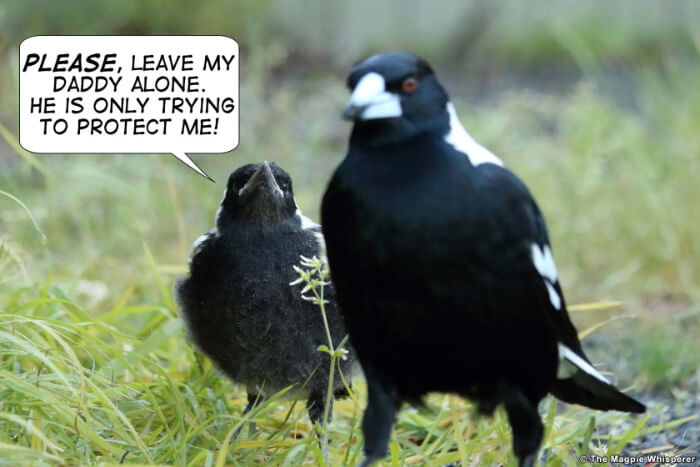Found a Baby Magpie? Here's What to Do Next!
Posted by The Magpie Whisperer on

During the nesting season, it's not uncommon for caring individuals to come across baby magpies and reach out to wildlife carers and veterinarians for assistance.
It's essential to know when and how to assist these little ones. While your compassion is invaluable, it's generally best to let them be with their parents if they're healthy and safe. Parental care is like a magic touch that significantly contributes to the growth and well-being of young magpies. These devoted parents provide essential lessons and nourishment, fostering the magpie's ability to thrive in the wild.
However, if you ever encounter a situation where a baby magpie is in immediate danger, your intervention can make a significant difference. Trust your instincts. If the little one is truly in distress, reaching out to wildlife carers is the right step. They possess the expertise needed to assess the situation and provide appropriate care, ensuring the magpie's safety and happiness.
The Importance of Patience and Observation
Sometimes, even with the best intentions, people may mistakenly believe that a baby magpie has been abandoned when, in reality, that's not the case. It's crucial to understand the remarkable attentiveness of magpie parents, who tirelessly provide nourishment and care to their young, even when they appear to be alone. In these situations, it's often best to exercise patience and refrain from interfering with the baby bird.
By waiting and observing from a distance, we give the magpie parents an opportunity to return and attend to their offspring. Magpie parents are highly attentive and have a keen sense of their young one's needs. They may momentarily leave their baby to gather food or address other matters.
Assessing the Situation and Bird: Guidelines for Careful Evaluation
 If you come across a baby magpie that appears to be abandoned, or in distress, it's natural to want to help. However, it's crucial to assess the situation before taking any action to ensure that the bird receives the appropriate care.
If you come across a baby magpie that appears to be abandoned, or in distress, it's natural to want to help. However, it's crucial to assess the situation before taking any action to ensure that the bird receives the appropriate care.
To assist you in determining whether the baby magpie requires assistance, we have created a flowchart that outlines the steps to follow. (Clicking on the image will allow you to access the high-resolution version.) This flowchart can aid you in evaluating the baby bird's health and behaviour, determining whether it is old enough to be on its own or still requires parental care, and deciding whether it needs to be rescued or left alone.
💡 Learn how to craft a makeshift nest here.
Basic Examination of the Bird
- Before beginning the examination, it's crucial to ensure the safety of both yourself and the bird. Examine the bird away from its parents to prevent them from swooping and causing distress. This will reduce stress for both the baby bird and its parents, making the examination process more effective.
-
Begin by gently inspecting the young bird, paying close attention to its wings, legs, and body. Look for any visible injuries, including cuts, bruises, blood, signs of open-beak breathing, wheezing, labored breathing, clicking sounds, or wounds. Take your time and carefully feel along its wings and legs to check for any unusual lumps, which might indicate fractures.
-
Besides external injuries, keep an eye out for signs of potential internal issues, which may not be immediately visible.
-
If you spot any injuries or suspect that the bird is unwell, don't hesitate to take action in its best interest. Contact your states wildlife organisation (listed below) immediately; they have the knowledge and resources for the right care and rehabilitation. If you believe the bird is gravely ill or badly injured, please take it to a wildlife-friendly veterinarian for a thorough examination and any necessary medical assistance.
If you are still uncertain after consulting the flowchart, it's best to reach out to your state's wildlife rescue organisation or a licensed wildlife caregiver for expert advice and support. These professionals have the knowledge and experience needed to determine if the bird is in need of intervention or if it should be left with its parents. They can also provide guidance on how to safely transport the bird and where to take it for appropriate care.
🪹 Need to craft a makeshift nest? We've got you covered! Read on to learn how to create one.
Why Seeking Professional Care is Essential
It is crucial to recognise that attempting to raise birds, such as magpies, without adequate experience and knowledge can pose significant challenges and potentially endanger the bird's overall well-being. Birds, including magpies, have unique dietary requirements and specific environmental needs that must be met to ensure their optimal growth, development, and overall health.
Proper nutrition is of utmost importance for birds, as it directly impacts their growth, immune function, and overall vitality. Inadequate or improper diet can result in severe consequences, including nutritional deficiencies, which may lead to various health problems and even death. Birds require a balanced and species-specific diet. Without the necessary knowledge and understanding of their dietary needs, it becomes challenging to provide birds with the appropriate nutrition they require for their well-being.
State Wildlife Organisations
| Victoria - Wildlife Victoria | (03) 8400 7300 |
| New South Wales - WIRES | 1300 094 737 |
| Queensland - Wildlife Rescue Queensland | 0478 901 801 |
| Western Australia - WA Wildlife | (08) 9474 9055 |
| South Australia - Fauna Rescue | (08) 8289 0896 |
| Tasmania - Bonorong | 0447 264 625 |
Magpies Are a Protected Species Under the Law
 It is important to understand that keeping them as pets or attempting to rehabilitate them in some states without proper licensing and training is illegal. This means that if you find an injured or orphaned magpie, you should not attempt to care for it yourself. Instead, it is essential to seek advice and assistance from licensed wildlife caregivers or wildlife rescue organisations who have the necessary permits and expertise to care for injured or orphaned magpies.
It is important to understand that keeping them as pets or attempting to rehabilitate them in some states without proper licensing and training is illegal. This means that if you find an injured or orphaned magpie, you should not attempt to care for it yourself. Instead, it is essential to seek advice and assistance from licensed wildlife caregivers or wildlife rescue organisations who have the necessary permits and expertise to care for injured or orphaned magpies.
By seeking their guidance and support, you can ensure that the baby magpie receives the best possible care and the best chance of survival. These experts will be able to assess the bird's condition, determine if it requires intervention, and provide appropriate care to ensure it recovers fully before being released back into the wild.



